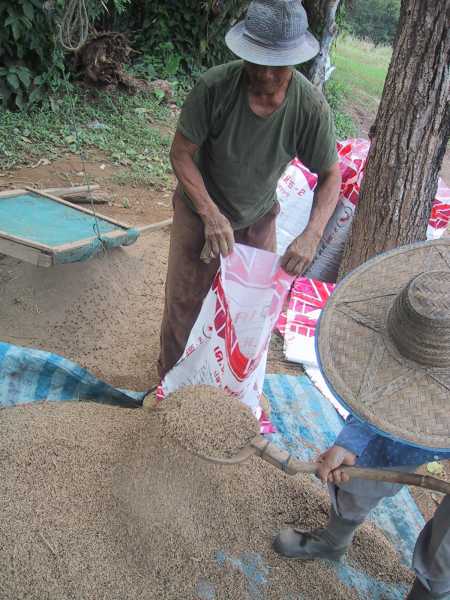In the midst of Thailand’s dramatic flood crisis, and the destruction of 10 or 20 percent of the main season rice crop, the government of Yingluck Shinawatra has commenced implementation of its highly contentious rice mortgage scheme. Under the scheme, farmers can receive a generous 15,000 baht per tonne for their rice (or less, depending on the moisture content) under an arrangment in which rice delivered to a nation-wide network of approved rice mills gives them immediate access to credit at the Bank of Agriculture and Cooperatives.
The scheme got underway in 30 provinces on 7 October, and farmers were reported to be already bringing in rice to participate in the scheme on the afternoon of that day. Appearing on Voice TV on the first day of the scheme’s operation, Deputy Commerce Minister Phum Saraphol was confident about the scheme’s success, but also realistic about the risks it faced. In particular he openly acknowledged the risk of corruption, saying that the government had to learn the lessons of the past and try to avoid them happening again.
He said that the government would be working hard to ensure that rice entering the scheme was legitimate. Monitoring techniques would include: comparing the amount of rice pledged by farmers with information on their land holdings; making sure that local authorities guaranteed that those participating in the scheme were actually rice cultivators; and using DNA testing to detect rice grown abroad and smuggled into Thailand. A special hotline has been set up to receive reports of impropriety.
In response to concerns expressed about the high cost of the scheme (with estimates of hundreds of billions of baht) the Minister argued that this was, in fact, a rotating fund with the government recovering the money it had invested once the rice was sold. (This certainly sounds attractive, but the fund will quickly diminish if the government cannot sell the rice at the high price it has paid to farmers.) He compared the government’s rotating rice fund with the non-rotating 70 billion baht outlay by the former Democrat government, which only provided farmers with 10,000 baht per tonne.
Minister Phum also argued that the overall cost of the scheme to the government would be reduced as a result of increased revenue deriving from the economic stimulus generated by additional income earned by rice farmers.
This ambitious and expensive rice scheme raises many questions which New Mandala will be following over the coming months. Key questions include:
- What will be the impact of higher rice prices on poor consumers?
- What will be the impact on Thailand’s rice exports?
- Will the government have to subsidise exports at a price lower than that paid to farmers?
- Will the government be successful in managing corruption?
- How much will rice millers and rice warehouse owners gain from the scheme?
- Will farmers who have lost their rice crop as a result of flooding want to switch back to an income-guarantee scheme?
 Facebook
Facebook  Twitter
Twitter  Soundcloud
Soundcloud  Youtube
Youtube  Rss
Rss 